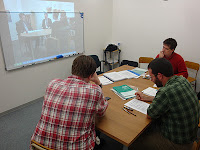Last week I mentioned that I/we had been 'mining' our young learners' graded readers in class.
I very much felt that was a work in progress, and more could be achieved - I set out with the same broad lesson plan in mind for another group, using the same level readers from OUP story tree series. I wanted to see if the same approach would work again, if there'd be a different result.

As per last time, I asked students first of all to figure out what kind
of words they were looking at eg "Jim eats fat green frogs" -
nouns/verbs/adjectives? Admit a bit of L1 to help them suss this out,
but not a lot. And, as per last time, then asked them to find ten
examples of each in their reader.
Well, kids being kids, when I asked them to get out their reader, there was the usual time out while pencil cases clattered to the floor/indecision about which book I meant/chatting opportunities...I had asked them to get out book 1 (they'd read all eight titles, and done the accompanying workbooks/listened to the CD narrations), so maybe this one was rustiest in memory.
Lightbulb moment: let them choose their "favourite" - quickly! First come first reserved - can't have the same book as another learner. Bingo! Decisions made pronto.
Now the students are responsible for the choice they made. I overheard a sotto voce discussion on how that choice was made (in L1) - "choose the book with the least pages". Aha! File that info away, see what we can do!
Also as per last time, I set a target of 10 nouns/verbs/adjectives - I was worried they would be lazy. Stupid teacher! This inhibited them from compiling a jumbo list - yes, they ignored my 'rule' and kept compiling, just writing smaller to squeeze stuff in! OK...I can work with that ambition too!
As they had all chosen a different book, they all had different questions about the words they were considering. Even with only four students I was getting dizzy. Bombardment nice, but I don't want to be the focus of this - figure it out yourselves, together! And so they did. Net result of that was a constant barrage of Qs at classmates "Hey, is treehouse a verb?" - "Erm. Yes, like dog. Is like a verb - it isn't "-suru" in Japanese. I intervened when one or two things crept up (like assuming all words had to be either noun/adjective/verb - my fault again...up/in/this etc started a need for a column with 'other'!)
So, now I have four kids speed reading four different books, scanning, skimming, analysing - and beautifully, interrupting each other & co-operating all the while (essentially side-reading the other three books & relighting all those memories of stories read). I was sitting there unbusy, glowing in pride - and mad as hell that one of this class announced (via mum) that 4 nights of ballet practice a week was not enough
NO!!!!
I called time when they had all more or less got to the last page of their chosen reader (awesome - they were getting pissed off because there weren't enough adjectives!)...always interrupt a good activity just before it runs out of steam! The easy finish = "How many verbs etc did you find?". I realised this was not going to be fair as some of them had got very enthusiastic/lost count and written down more; there was some repetition too (which helped us figure out why go = goes, for example). All good - we are learning TONS.
Solution. Remember the board/word game Scattergories? It's another EFL goldmine of a game, especially for end of term. Basic premise is that if you have written down an original word ie one that no other student has done, you score a point. (Part one winner was the student with the most words total; and sub-champions for each sub-category - everyone a winner). And then the penny dropped, as we read out all our words...Ayaka was going to win all ends up (even though she had complained the most about her book because her book was the 'hardest'?) Book 7 trumps 1,2,3! Oh, the books get harder? She had all our words
and then some?
Gorgeous. The smile on Ayaka's face. Triumph!
Gorgeous. The dawning of ambition!
=========================================================================
OK, I got excited about my kids killing a lesson plan as we went? Oh yeah! What they did ticked a dozen boxes all over the place, with materials otherwise 'dead'.
This 'mining' activity will work with adults - especially if they are all using the same reader - give them the same chapter and a time limit? Let them choose their fave character if there is dialogue....and that is their word pool. Or their favourite chapter, or even number pages - whatever!












